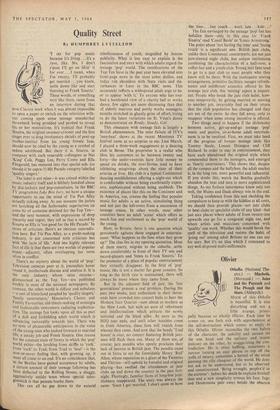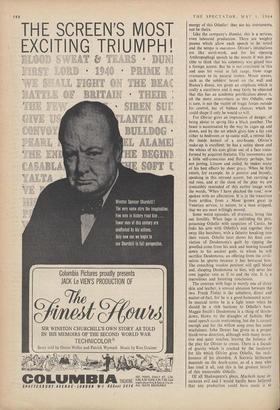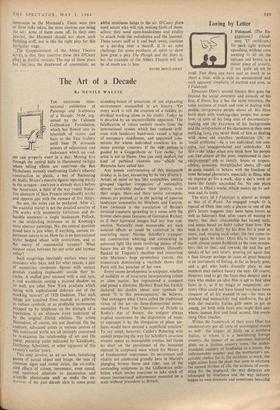Olivier
Othello. (National The- atre.) — Macbeth.
(Mermaid.) — Juno and the Paycock and The Plough and the Stars. (Aldwych.) MUCH of this Othello is beautiful. It is also disturbing and not a little strange, princi- pally because so wholly Olivier. Each time he comes on, one feels sick with apprehension at the self-destruction which comes so easily to this Othello. Olivier reconciles the two halves of the character, the nobility and success on the one hand and the epilepsy and insane jealousy on the other, by exaggerating the con- tradiction. He is often baffling, sometimes a farceur turning an easy phrase to top off the wells of misery, sometimes a hermit of the mind piercing the silly clangour of the world. He does not ask to be understood, but to be observed and commiserated. 'Being wrought, perplex'd in the extreme': before his death he explains himself thus and a new simplicity crosses his face. lago and Desdemona pale away beside the obscure energy of this Othello: they are his instruments, not he theirs.
Like the company's Hamlet, this is a serious, even laboured production. There are weighty pauses which allow each speech to be noted and the tempo is mae.stoso. Olivier's intonations are like anvil-work, and for his opening Anthropophagi speech to the senate it was pos- sible to think that his solemnity was guyed into a foreign accent. But he is not consistent in this and uses his voice in full range, from stage resonance to its natural timbre. Minor scenes, such as the soldiers' brawl on the wall and Bianca's dance, are given an emphasis which is really a stateliness and it may fairly be objected that this has an 'academic petrification about it, all the more unnecessary as this Othello, one is sure, is not the victim of tragic forces outside his control, but of human chances which he could shape if only he would so will.
For Olivier gives an impression of danger, of being abOut to spring like a black panther. The beast is accentuated by the way he cages up and down, and by the set which gives him a far exit either to bedroom or to castle wall, a retreat like the inside kennel of a zoo-house. Olivier's make-up is excellent; he has a satiny sheen and the whites of his eyes glitter out of a face trans- formed by acquired features. The movements are a little self-conscious and fluttery perhaps, but not jarring. Lissom and coiled, he makes many of his best effects by sheer grace. When he first enters, for example, he is pensive and broody, speaking in this stressed accent, but carrying a red rose, and at the close of the play we are irresistibly reminded of this earlier image with the words, 'When" have plucked the rose,' now spoken with no affectation. It is in the transition from artifice, from a Moor grown great in Venetian service, to nature, to a man stripped, that we are most willingly moved.
Some weird episodes, all draMatic, bring this out forcibly. When lago is unfolding the plot, poisoning Othello with suspicion of Cassio, he links his arm with Othello's and together they sway like banshees, with a falsetto breaking into their voices. Othello later shows his final con- viction of Desdemona's guilt by ripping the jewelled cross from his neck and bowing himself down to his ancient gods, to whom he will sacrifice Desdemona, an offering from the civili- sation he spurns because it has betrayed him. The crouching voodoo penitent will spill blood and, clasping Desdemona to him, will sever his own jugular vein as if to end the rite. It is a marvellous and haunting conclusion.
The contrast with sago is mostly one of shiny skin and leather, a sensual abrasion between the two. Frank Finlay is the subaltern, direct and matter-of-fact, for he is a good-humoured actor. In musical terms he is a light tenor when he should be a rich baritone to Othello's bass. Maggie Smith's Desdemona is a thing of thistle- down, blown by the draughts of fashion. Her nasal speech needs overcoming, but she is correct enough and for the willow song even has some wistfulness. John Dexter has given us a proper blank-verse direction, although with many inven- tive and quiet touches, leaving the balance of the play for Olivier to create. There is a facade of gravity which is cracked by the insolence for life which Olivier gives Othello, the reck- lessness of his abandon. A Socratic blitheness descends on the death-scene, as of a man who has tried it all, and this is the greatest beauty of this memorable Othello.
Of all Shakespeare's plays, Macbeth most in- carnates evil and I would hardly have believed that any production could have made it as innocuous as the Mermaid's. There were two or three risks taken, the most obvious one being the set: none of them came off. In their own interest, the Mermaid should not show such fledgling stuff, nor is this the right play for this particular stage.
The disappointment of the Abbey Theatre actors is that they contrive these two O'Casey plays as dutiful revivals. The sap of these plays has run into the deadwood of convention; an awful mustiness hangs in the air. O'Casey plays need actors who will risk making fools of them- selves; they need open-handedness and vitality to attack both the melodrama and the humour. These actors sniff at it and back away, cautious as a pet-dog near a mastiff. It is an open challenge for some producer of spirit to show how great a play The Plough and the Stars is, but the example of the Abbey Theatre will not be of much use to him.
DAVID PRYCE-JONES
















































 Previous page
Previous page